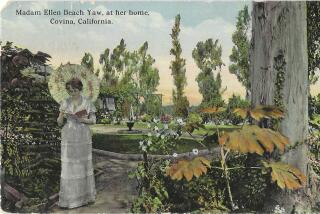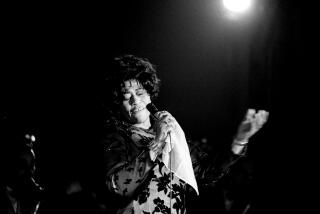Susannah McCorkle; Jazz Singer Lauded for Cabaret Performances
- Share via
Susannah McCorkle, a leading cabaret singer who was considered one of the finest interpreters of lyrics in the world of jazz, died Saturday in New York City. She was 55.
Police were investigating her death as a suicide, wire services reported, saying she apparently jumped from her Manhattan apartment. Authorities found a suicide note in her apartment but did not reveal its contents.
McCorkle, a tall blond with a delicate, indefinable speaking voice, recorded 17 albums for such labels as Inner City and Concord, and although many garnered critical praise in the popular press and jazz record guides, sales were less than brisk.
Her forte was the cabaret form, in which she could connect with the audience in a theatrical manner, sometimes intimate and sometimes funny.
One critic, writing in Rolling Stone, said McCorkle “utilizes the grammar of jazz with a sense of personal involvement that is often lacking in singers of American popular songs.”
Singing, however, was not something that came to McCorkle early in life. In fact, she didn’t take it up professionally until she was in her mid-20s and living in Paris. And that was only after hearing Billie Holiday on some cheap records she had purchased at a French drugstore.
McCorkle was born in Berkeley, and her family moved around as her anthropologist father took various teaching positions.
Interested in writing as a child, she won a college fiction contest sponsored by Mademoiselle magazine. Another story appeared in an O. Henry collection of prize short stories. She also wrote biographical sketches of singers Bessie Smith and Ethel Waters, which were published in American Heritage magazine.
McCorkle turned her focus to foreign languages when she went to UC Berkeley, graduating with a degree in Italian. Over the years she also became fluent in Spanish, French and German.
McCorkle left for Paris soon after graduating, and her singing education began.
“That’s where I discovered Bessie Smith and Billie Holiday,” she told The Times some years ago.
“I had no desire to become a singer until I heard Billie Holiday. The first time I heard her on a record, it was a revelation. She sounded like a woman singing about herself. . . . No sentimentality, no theatricality--just feeling. I felt I’d like to take that approach, that directness, and apply it to all kinds of songs.”
In the early 1970s, on the verge of taking a translating job in Brussels with the Common Market, McCorkle moved to London to give singing a try.
At first the jobs were sparse, but she kept herself going with interpreting and translating work. But her recording career got a break in London. With the help of pianist and arranger Keith Ingham she completed albums of the songs of Johnny Mercer, Yip Harburg and Harry Warren.
Over the years, she built a substantial career in jazz clubs and cabarets, moving seamlessly from standards to blues to Brazilian tunes. Her broad linguistic talents allowed her to handle songs in French, Portuguese and English.
But the cabaret and club road is a hard one for any singer, a fact that McCorkle once alluded to in an interview with Don Heckman, who writes about jazz and cabaret for The Times.
“Somebody called me a ‘bruised romantic’ once, and I like that,” she said. “It describes what I hope I bring to these classic songs. Because the truth is that--even with everything I’ve gone through--I still have a basic optimism about life. And my belief in [Cole] Porter, the Gershwins, Rodgers & Hart and [Brazilian songwriter Antonio Carlos] Jobim has given me a real sense of mission, as well as a creative way to express that optimism.”
More to Read
The biggest entertainment stories
Get our big stories about Hollywood, film, television, music, arts, culture and more right in your inbox as soon as they publish.
You may occasionally receive promotional content from the Los Angeles Times.








